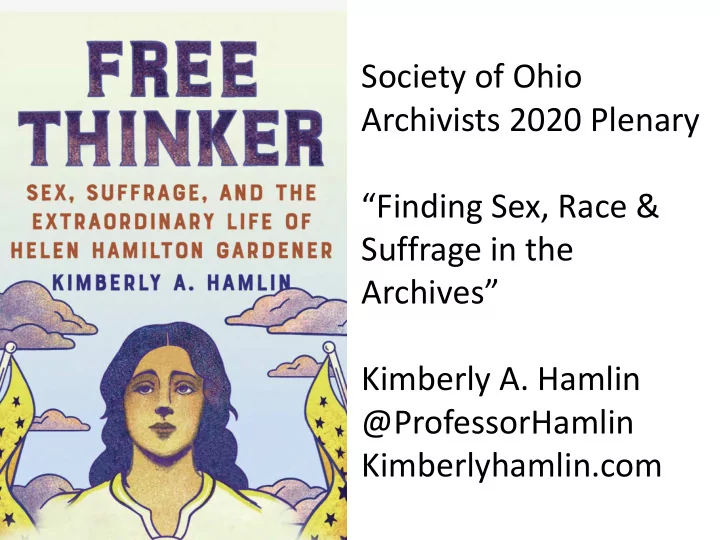

Society of Ohio Archivists 2020 Plenary “Finding Sex, Race & Suffrage in the Archives” Kimberly A. Hamlin @ProfessorHamlin Kimberlyhamlin.com
Who was Helen Hamilton Gardener? The “fallen woman” who changed her name (born Alice Chenoweth), reinvented herself, and became one of the best-known speakers and writers of the 19 th Century. In the early 1900s, she reinvented once more – married a Civil War hero, moved to Washington, DC and became the suffragists’ lead negotiator, credited with getting the 19 th Amendment through Congress.
Today’s Talk… • 1) where I went and Themes (which are not what I looked for often in finding aids): • 2) Library of Congress Manuscript Division 1) Sex/sexism • 3) Collections of: 2) Race/racism Woodrow Wilson, Edith 3) Memory/forgetting Wilson, Joseph Tumulty, Adelaide Johnson, Sen. John Sharp Williams (D- MS)
Focusing on 4 documents from LOC 1) “Little One” to “Little 3) John Sharp Williams to Phil,” August 11, 1901, HHG, Jan. 21, 1918, JSW Adelaide Johnson papers papers 2) HHG to Tumulty, July 5, 4) WW handwritten note, 1916, Woodrow Wilson January 8, 1918, Tumulty papers papers
The Correspondence of Others…HHG in the Adelaide Johnson Collection
HHG in Wilson Papers Index
Several days after HHG sent her first note to Tumulty, NAWSA leaders requested a meeting with the President
Senator John Sharp Williams (D-MS). The “most erudite man in the Senate” whom HHG tried unsuccessfully to turn into a “yes” vote. He explicitly opposed black women voting and introduced an amendment limiting the franchise to white women.
John Sharp Williams Papers
HHG to JSW, Jan. 20, 1918
Sen. John Sharp Williams to HHG, Jan. 21, 1918
Recommend
More recommend